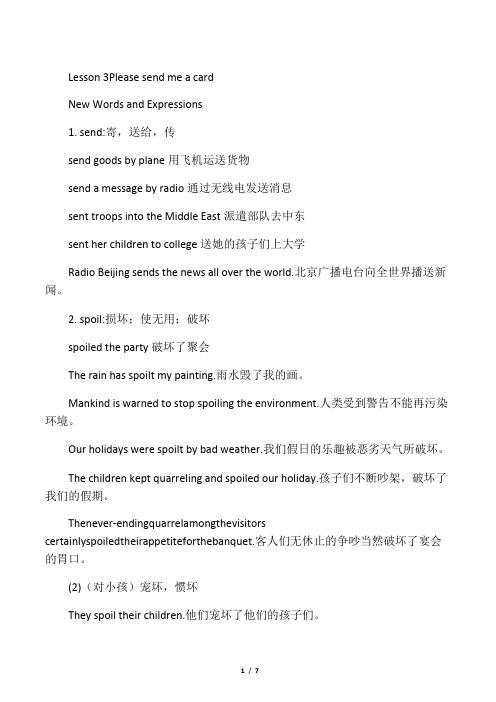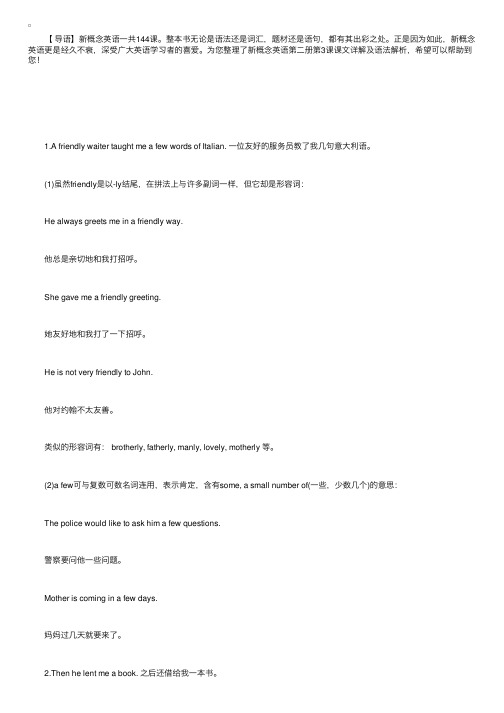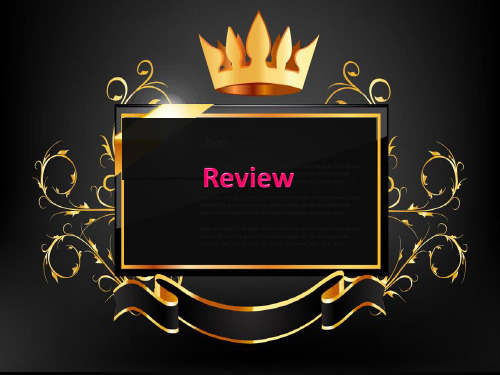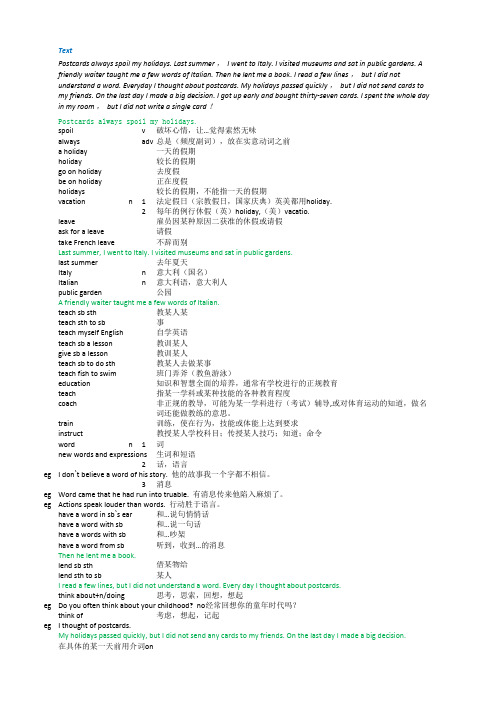新概念英语第二册1-3课讲义
新概念第二册讲义全部

新概念第二册讲义全部摘要:一、新概念第二册概述二、关键句型练习答案解析1.Lesson 152.Lesson 16三、难点练习答案解析四、多线选择题答案解析五、实用学习建议正文:新概念第二册是一本英语学习教材,旨在帮助学生提高英语听、说、读、写四项基本技能。
通过学习本册内容,学生将能更好地理解和运用英语日常口语及书面表达。
以下是对新概念第二册讲义的全面概述。
一、新概念第二册概述新概念第二册共包含144课,分为四个单元。
课程内容涵盖了日常生活、工作、学习等各个方面,语言实用且易于理解。
通过学习本册内容,学生将能够掌握基本的英语语法、句型和词汇,进一步提高英语应用能力。
二、关键句型练习答案解析1.Lesson 15关键句型练习答案如下:A:1a.The secretary told me that Mr.Harmsworth would see me.1b.Mr.Harmsworth will see you.2a.Mr.Harmsworth said that business was very bad.2b.Business is very bad.3a.Mr.Harmsworth told me that the firm could not afford to pay such large salaries.3b.The firm cannot afford to pay such large salaries.B:1.told would come/would be coming2.said (had) cut3.told had never played4.did he say had done/would do5.did he tell (had) bought/would buy6.said could not7.said (had) worked8.told wrote/writes/had never written9.did you say were/had been10.said would wait2.Lesson 16关键句型练习答案如下:A:1.The word if has been used four times.2.If I listen to the radio, I will never pass.3.If it rains, I will get wet.4.If you want me to do something, don"t blame me.5.If the house is untidy, don"t blame me.B:1.told would come/would be coming2.said (had) cut3.told had never played4.did he say had done/would do5.did he tell (had) bought/would buy6.said could not7.said (had) worked8.told wrote/writes/had never written9.did you say were/had been10.said would wait三、难点练习答案解析针对新概念第二册中的难点句型,我们提供了详细的答案解析,帮助学生更好地理解和掌握这些语法结构。
新概念英语第二册逐句精讲语言点第1课(1)

Lesson 1 A private conversation课⽂内容:Last week I went to the theatre. I had a very good seat. The play was very interesting. I did not enjoy it. A young man and a young woman were sitting behind me. They were talking loudly. I got very angry. I could not hear the actors. I turned round. I looked at the man and the woman angrily. They did not pay any attention. In the end, I could not bear it. I turned round again. 'I can't hear a word!' I said angrily.'It's none of your business, ' the young man said rudely. 'This is a private conversation!'本⽂语法:简单陈述句语法归纳:⼀个完整的简单陈述句⼀般包括主语+谓语(+宾语+⽅式状语+地点状语+时间状语),其中状语可前置于句⾸。
精讲笔记:st week I went to the theatre.上星期我去看戏。
语⾔点1 时间状语开门见⼭,点明时态为过去时,因⽽谓语动词go to使⽤过去式went to。
语⾔点2 在theatre,cinema,picture等名词前⼀定要加定冠词the。
如:go to the theatre/play去看戏;go to the cinema/movies 去看电影(英/美);go to the pictures/films去看电影;be at the theatre/cinema在戏院看戏/在电*看电影。
新概念英语第二册第三课教案

Lesson 3Please send me a cardNew Words and Expressions1. send:寄,送给,传send goods by plane用飞机运送货物send a message by radio通过无线电发送消息sent troops into the Middle East派遣部队去中东sent her children to college送她的孩子们上大学Radio Beijing sends the news all over the world.北京广播电台向全世界播送新闻。
2. spoil:损坏;使无用;破坏spoiled the party破坏了聚会The rain has spoilt my painting.雨水毁了我的画。
Mankind is warned to stop spoiling the environment.人类受到警告不能再污染环境。
Our holidays were spoilt by bad weather.我们假日的乐趣被恶劣天气所破坏。
The children kept quarreling and spoiled our holiday.孩子们不断吵架,破坏了我们的假期。
Thenever-endingquarrelamongthevisitors certainlyspoiledtheirappetiteforthebanquet.客人们无休止的争吵当然破坏了宴会的胃口。
(2)(对小孩)宠坏,惯坏They spoil their children.他们宠坏了他们的孩子们。
The child was spoilt by his grandfather.这个孩子被他的爷爷给惯坏了。
3. friendly:友好的;朋友般的friendly advice友好的建议a friendly warning忠告He is friendly to us all.他对我们大家都很友好。
新概念英语第二册第3课课文详解及语法解析

【导语】新概念英语⼀共144课。
整本书⽆论是语法还是词汇,题材还是语句,都有其出彩之处。
正是因为如此,新概念英语更是经久不衰,深受⼴⼤英语学习者的喜爱。
为您整理了新概念英语第⼆册第3课课⽂详解及语法解析,希望可以帮助到您! 1.A friendly waiter taught me a few words of Italian. ⼀位友好的服务员教了我⼏句意⼤利语。
(1)虽然friendly是以-ly结尾,在拼法上与许多副词⼀样,但它却是形容词: He always greets me in a friendly way. 他总是亲切地和我打招呼。
She gave me a friendly greeting. 她友好地和我打了⼀下招呼。
He is not very friendly to John. 他对约翰不太友善。
类似的形容词有: brotherly, fatherly, manly, lovely, motherly 等。
(2)a few可与复数可数名词连⽤,表⽰肯定,含有some, a small number of(⼀些,少数⼏个)的意思: The police would like to ask him a few questions. 警察要问他⼀些问题。
Mother is coming in a few days. 妈妈过⼏天就要来了。
2.Then he lent me a book. 之后还借给我⼀本书。
像send, buy, give等动词⼀样,lend可以有两个宾语:⼀个直接宾语(通常指物),⼀个间接宾语(通常指⼈)。
(cf. 本课语法)在这句话中,lend的直接宾语为a book,间接宾语为me。
Would you lend me your pen? 能把你的笔借我⽤⼀下吗? Yesterday I lent my dictionary to Mary. 昨天我把字典借给了玛丽。
新概念英语第二册第三课Please send me a card

3)cost 常用物作主语,表“价值或花费多少钱”。 • sth. cost sb. sm. This pen costs me 30 yuan. How much does the pen cost? 4)take 常用于花时间,主语是物。 It takes (took) sb. sometime to do sth. It takes me an hour to go to school by bike . It will take us a long time to finish the work.
All roads to Rome.条条大路通罗马。
Crazy for water and carnival?
• Go to Venice (威尼斯,意大利东北部城市)
a post office
a postcard
In foreign countries, visitors will send postcards to their friends when they travel.
• 4.I paid ¥25 _____ the beef, and I only got a little. (2009 沈阳)
• A. for B. on C. in
D. to
• 答案:A
• 5.—How much money did you ____ in fixing your watch? —About ten Yuan. (2008 贵阳)
3/7/2020
friendly adj. 友好的
裕兴新概念英语第二册笔记_第3课_课文讲解

eg She spends all her money and time on clothes.
She spends all her money and time in buying clothes.
eg I spent a whole hour in explaining the importance of learning English to him.
在具体的某一天前用介词on
I got up early and bought thirty-seven cards. I spent the whole day in my room, but I did not write a single card!
spend
v 花费
(主语是人)
cost
v 费用
a bit of 一点儿,一些,一小块儿,一小片儿
a bit of land
一小块地
a little bit of cheese
一小块奶酪
3 消息
eg Word came that he had run into truable. 有消息传来他陷入麻烦了。
eg Actions speak louder than words. 行动胜于语言。
have a word in sb`s ear
和…说句悄悄话
have a word with sb
2 She bought me a tie.
他给我买了条领带。
She bought a tie for me.
3 He handed me the prize. 他把这个奖颁给了我。
He handed the prize to me.
4 The shop assistant found some curtain material for me.
新概念英语第二册 lesson 1
lesson 1 A private conversationLesson 1 A private conversation课文内容:Last week I went to the theatre. I had a very good seat. The play was very interesting. I did not enjoy it. A young man and a young woman were sitting behind me. They were talking loudly. I got very angry. I could not hear the actors. I turned round. I looked at the man and the woman angrily. They did not pay any attention. In the end, I could not bear it. I turned round again. ‘I can't hear a word!’ I said angrily.‘It's none of your business, ’ the young man said rudely. ‘This is a private conversation!’Notes on the text 课文注释1 go to the theatre,去看戏。
2 got angry,生气。
3 turn round,转身,也可用turn around。
4 pay attention,注意。
5 I could not bear it.我无法忍受。
其中的it是指上文中的那对男女大声说话又不理会作者的愤怒目光。
6 none of your business,不关你的事。
参考译文:上星期我去看戏。
我的座位很好,戏很有意思,但我却无法欣赏。
新概念第二册讲义全部
新概念第二册讲义全部(最新版)目录1.新概念第二册概述2.新概念第二册内容梗概3.新概念第二册的学习价值4.新概念第二册的辅助资源5.新概念第二册的推荐学习方法正文一、新概念第二册概述《新概念英语》第二册是一本针对英语初学者的教材,旨在帮助学习者掌握基本的英语语法和词汇,提高阅读、写作和口语表达能力。
本书涵盖了丰富的英语知识,包括语法、词汇、句型、阅读理解等,同时通过有趣的课文和练习,让学习者在轻松愉快的氛围中学习英语。
二、新概念第二册内容梗概《新概念英语》第二册共分为 12 个单元,每个单元都包含了课文、词汇、语法和练习等内容。
具体来说,每个单元的课文都围绕一个主题展开,学习者可以通过阅读这些课文了解英语国家的文化和生活方式;词汇部分提供了课文中出现的生词和短语,方便学习者查阅和记忆;语法部分讲解了课文中涉及到的语法知识点,帮助学习者巩固和拓展语法知识;练习部分则提供了各种形式的练习题,让学习者在巩固所学知识的同时,提高英语应用能力。
三、新概念第二册的学习价值《新概念英语》第二册对于英语初学者来说具有很高的学习价值。
首先,本书以简单易懂的方式介绍了英语的基本语法和词汇,让学习者能够快速掌握英语的基本知识;其次,通过丰富的课文和练习,学习者可以在实践中不断提高英语的阅读、写作和口语表达能力;最后,本书的内容和编排旨在激发学习者的兴趣,让学习者在轻松愉快的氛围中提高英语水平。
四、新概念第二册的辅助资源为了帮助学习者更好地学习《新概念英语》第二册,市场上推出了许多辅助资源,如课后答案、笔记、语法讲解、练习详解等。
同时,学习者还可以通过网络资源,如视频课程、在线笔记等,来提高自己的学习效果。
五、新概念第二册的推荐学习方法学习《新概念英语》第二册时,推荐采用以下方法:1.坚持每天学习:每天抽出一定的时间来学习,保持学习的连续性和习惯性。
2.结合课文学习语法:通过阅读课文,学习其中的语法知识点,并尝试在实际应用中运用。
新概念英语第二册-Lesson
03 learning resource
Textbooks and exercise books
Textbooks
New Concept English Volume 2 includes four textbooks,each containing 12 lessons,covering all the necessary grammar,vocabulary, and reading comprehension skills.
Target audience
Beginner to intermediate learners
The course is suitable for English learners who have a basic understanding of English but want to improve their fluency and accuracy.
调整学习策略
根据学习进度和效果,适 时调整学习策略,如改变 学习方法、增加学习时间 等,以提高学习效果。
Assessment and adjustment of learning outcomes
设定评估标准
明确评估学习成果的标准,如考试成 绩、口语表达能力等,以便对学习成 果进行客观评价。
评估学习成果
建议教师采用更多互动式教学方法, 如小组讨论、角色扮演等,以提高学 生的学习兴趣和参与度。
Teacher feedback
希望老师能及时给予学生反馈,帮助 学生更好地了解自己的学习状况和需 要改进的地方。
Adult learners
The course is particularly suitable for adult learners who have a more mature learning style and are more self-directed in their learning process.
new concept english新概念英语第二册(1-13)
新概念英语第二册Lesson 1 A private conversation课文内容:Last week I went to the theatre. I had a very good seat. The play was very interesting. I did not enjoy it. A young man and a young woman were sitting behind me. They were talking loudly. I got very angry. I could not hear the actors. I turned round. I looked at the man and the woman angrily. They did not pay any attention. In the end, I could not bear it. I turned round again. ‘I can't hear a word!’ I said angrily.‘It's none of your business, ’ the young man said rudely. ‘This is a private conversation!’Notes on the text课文注释1 go to the theatre,去看戏。
2 got angry,生气。
3 turn round,转身,也可用turn around。
4 pay attention,注意。
5 I could not bear it.我无法忍受。
其中的it是指上文中的那对男女大声说话又不理会作者的愤怒目光。
6 none of your business,不关你的事。
参考译文:上星期我去看戏。
我的座位很好,戏很有意思,但我却无法欣赏。
一青年男子与一青年女子坐在我的身后,大声地说着话。
- 1、下载文档前请自行甄别文档内容的完整性,平台不提供额外的编辑、内容补充、找答案等附加服务。
- 2、"仅部分预览"的文档,不可在线预览部分如存在完整性等问题,可反馈申请退款(可完整预览的文档不适用该条件!)。
- 3、如文档侵犯您的权益,请联系客服反馈,我们会尽快为您处理(人工客服工作时间:9:00-18:30)。
Lesson 1I. Warming-up1. Do you go to the theatre? When did you go?2. Did you have a good seat?3. What was the play like?4. Did you enjoy the play?5. Did you have any unusual experience when going to the theatre?II. Comprehension questionsIII. Words and grammarprivate adj.私人的it's my private letter/house ;private school:私立学校public:公众的,公开的public school ;public letter 公开信;public place :公共场所privacy:隐私it's a privacy. adj. 《Private Ryan》private soldier:大兵private citizen 普通公民private life:私生活★conversation n.谈话subject of conversation:话题talk.可以正式,也可以私人的conversation. 比较正式一些Let’s have a talk They are having a conversation.conversation 用的时候比talk正式,意思上往往不非常正式.talk:可正式可不正式dialogue:对话China and Korea are having a dialogue. 正式chat: 闲聊gossip:嚼舌头have a + talk/chat/dialogue/conversation/gossip 名词变动词★seat n.座位have a good seat(place)take a seat : 座下来,就座take your seat/take a seat be seated, please 更为礼貌Is the seat taken? 这个座位有人吗?seat是及物动词,后面有宾语sit是不及物动词,后面不加宾语seat后面会加人; seat sb; seat him; seat:让某人就座you seat him;When all those present(到场者)_D_ he began his lecture.(重点题)A.sitB.setC.seatD.were seaed★angry adj. 生气的cross=angry ; I was angry. He was cross. annoyed: 恼火的;I was annoyed. I was angry/cross. I was very angry.be blue in the face; I am blue in the face.★attention n. 注意Attention ,please. 请注意pay attention :注意pay attention to : 对什么注意You must pay attention to that girl.pay a little attention :稍加注意pay much attention :多加注意pay more attention :更多注意pay no attention :不用注意★bear(bore,borne) v. 容忍bear, stand endure :忍受,容忍put up with :忍受I can't bear/stand youI got divorced.I could not put up with himbear/stand/endure忍受的极限在加大put up with=bear=standbear n.熊white bear bear hog :热情(热烈)的拥抱give sb a bear hug★business n. 事do business: 做生意go to some place on business:因公出差thing 可以指事情,也可以指东西It's my business 私人事情It’s none of your business.Simple past tenseA. 用法1)在确定的过去时间里所发生的动作或存在的状态。
例如:时间状语有:yesterday, last week, an hour ago, the other day, in 1982等。
例如:Where did you go just now? 刚才你上哪儿去了?2)表示在过去一段时间内,经常性或习惯性的动作。
例如:When I was a child, I often played football in the street. 我是个孩子的时候,常在马路上踢足球。
Whenever the Browns went during their visit, they were given a warm welcome.那时,布朗一家无论什么时候去,都受到热烈欢迎。
典型例题---- Your phone number again? I ___ quite catch it.---- It's 69568442.A. didn'tB. couldn'tC. don'tD. can't答案A. 本句虽没有明确的时间状语,但从语意上看出,在听的时候没有听懂这个动作发生在过去,因此应用过去时。
B. 常用一般过去时的句型:1)It is time for sb. to do sth"到……时间了""该……了"。
例如:It is time for you to go to bed.你该睡觉了。
It is time that sb. did sth. "时间已迟了""早该……了"例如It is time you went to bed.你早该睡觉了。
2)would (had)rather sb. did sth.表示'宁愿某人做某事'。
例如:I'd rather you came tomorrow.还是明天来吧。
3)used to / be used toused to + do:"过去常常"表示过去习惯性的动作或状态,但如今已不存在。
例如:Mother used not to be so forgetful.老妈过去没那么健忘。
Scarf used to take a walk. 斯卡夫过去常常散步。
be used to + doing:对……已感到习惯,或"习惯于",to是介词,后需加名词或动名词。
例如:He is used to a vegetarian diet.Scarf is used to taking a walk. 斯卡夫现在已习惯于散步了。
C. 特殊用法1)wish, wonder, think, hope 等用过去时,作试探性的询问、请求、建议等,用过去时表示现在,表示委婉语气。
例如:Did you want anything else? 您还要些什么吗?I wondered if you could help me. 能不能帮我一下。
2)情态动词could, would也用过去时表示现在,表示委婉语气。
例如:Could you lend me your bike? 你的自行车,能借用一些吗?Lesson 2I. Warming-up1. Do you get up early on weekends? Did you get up early last Saturday and Sunday?2. Was last Sunday a nice day? What did you do that day?II. Comprehension questionsIII. Words and grammar★until prep.直到直到...才; 直到...为止后面加(时间状语)从句,前面就是主句1) His father didn't die until he came back. (肯定)直到他回来,他爸爸才死。
2) His father was alive until he came back. (否定)直到他回来为止,他爸爸都是活着的。
He ___A(C)___(wait) until it stopped raining.A. waitedB.didn't waitA.leaveB.leftC.didn't leaveI stay in bed until twelve o'clock. I didn't get up until 12 o'clock.★ring(rang.rung) v.(铃、电话等)响(刺耳的)The telephone(door bell) is ringing. 给某人打电话: ring sb.Tomorrow I'll ring you.打电话(名) : give sb. a ring remember to ring me/remember to give me a ring戒指(名词)★repeat v.重复repetitionLesson 3I. Warming-upDo you like holidays? What do you usually do on holidays? Did you travel abroad? Did you get your holiday spoiled? What always spoils your holiday?II. Comprehension questionsIII. Words and grammar★send v. 寄,送send sth.to sb./send sb.sthgive sb.sth./give sth.to sb. send/take children to school send for sb.★postcard n. 明信片namecard/visiting card : 名片ID card:身份证credit card:信用卡cash card★spoil(spoiled or spoilt) v. 使索然无味,损坏break: 打破spoil: 把东西的质量变得不好;生活中不顺心的事;宠坏,溺爱His parents spoiled the boy. 宠坏Spare the rod, spoil the child.This spoiled my day. What you said spoiled me. His arrival spoiled my holiday.damage: 破坏,程度不一定很重destroy:破坏,彻底摧毁★decision n. 决定v. decidemake a big/great dicision★whole adj. 整个的all the...the whole...Exercise 1 Tell the story with the following notes.A.Tom—went—theatre—last week didn’t enjoy—play—although—interestingyoung man—young woman—sat behind him talking loudlygot angry—because—couldn’t hear the actors he—turned around—looked at them angrily they—didn’t pay any attention to finally—couldn’t bear it any longersaid—―can’t hear a word‖young man replied—―none of your business‖—―private conversation‖B.postcard—always—spoil—Jim’s holiday last summer—went to—Italyvisited museums—sat in public gardens a waiter—taught him—a few Italian words he—lent Jim—a book—not understand every day—thought about—postcardsholidays—passed quickly—but—not write—a single cardon the last day—decided to –write cards—friendsspent the whole day—his room—wasted his time—didn’t write anythingExercise 21) Mother ____me a new coat yesterday. I _______ it on. It fits me well.A. had made…have triedB. made…have trie dC. has made…triedD. made…tried2) ---―He ____to draw horses already‖. ---―When ______ he learn to draw them?‖--- ―Last year.‖A. learned...has B. learned...did C. has learned...has D. has learned (i)3) ---____ you _____ the text yet ? ---Yes, we ____ it two hours ago.A. Did…copy…didB. Have…copied…haveC. Have…copied…didD. Did …copy…had4) ---―Why ______ she _______ angry ?‖ ---―Because he _____ at her just now.‖A. did…get…shoutedB. has…got…shoutedC. did…get…has shoutedD. has…got…has shouted5) You ____ me waiting for two hours. I ____ for you since five.A. kept…waitedB. have kept…waitedC. kept…have waitedD. have kept…have waited6) ---Where ______ John _______ ? ---To the library. He _________ there for an hour.A. has…been…has goneB. has…gone…has beenC. did…go…wentD. did…be…went7) ---______ the baby still _____ ? ---No, it _______ crying.A. Has…cried…has stoppedB. Is…crying…stoppedC. Did …cry…stoppedD. Is…crying…has stopped8) I _______ the way. I ________ here for quite many years.A. knew...have lived B. knew...live C. know...have lived D. know (iv)9) ---_____ you ever _____ America ? ---Yes, I have.A. Have…gone toB. Have…gone inC. Have…been toD. Have …been in10) He ________ the Army by the end of 1989. He ______ in the army since then.A. joined…isB. has joined…has beenC. had joined…isD. had joined …has been11)Both his parents look sad . Maybe they _________what's happened to him.A. knewB. have knownC. must knowD.will know12) He has _______ been to Shanghai, has he ?A. alreadyB.neverC.everD. still。
